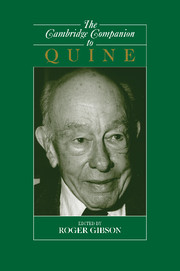Book contents
- Frontmatter
- Willard Van Orman Quine
- 1 Aspects of Quine’s Naturalized Epistemology
- 2 Quine on the Intelligibility and Relevance of Analyticity
- 3 Quine’s Meaning Holisms
- 4 Underdetermination of Physical Theory
- 5 Quine on Reference and Ontology
- 6 Indeterminacy of Translation
- 7 Quine’s Behaviorism cum Empiricism
- 8 Quine on Modality
- 9 Quine and Logical Positivism
- 10 Quine and Logic
- 11 Quine on Quine
- Selected Bibliography
- Index
8 - Quine on Modality
Published online by Cambridge University Press: 28 May 2006
- Frontmatter
- Willard Van Orman Quine
- 1 Aspects of Quine’s Naturalized Epistemology
- 2 Quine on the Intelligibility and Relevance of Analyticity
- 3 Quine’s Meaning Holisms
- 4 Underdetermination of Physical Theory
- 5 Quine on Reference and Ontology
- 6 Indeterminacy of Translation
- 7 Quine’s Behaviorism cum Empiricism
- 8 Quine on Modality
- 9 Quine and Logical Positivism
- 10 Quine and Logic
- 11 Quine on Quine
- Selected Bibliography
- Index
Summary
One main theme in Quine’s philosophy, one that emerged in the very early article “Truth by Convention” (1936), was skepticism toward the notions of meaning and analyticity. These were key notions in the work of Carnap and other philosophers whom Quine regarded highly. His criticism soon spread to the notions of logical necessity and possibility, which, following Carnap and C. I. Lewis, he regarded as closely connected with the former notions. Carnap and Lewis subscribed to the so-called linguistic view on necessity, which Quine formulated this way: “[A[ statement of the form 'Necessarily … ' is true if and only if the component statement which 'necessarily' governs is analytic, and a statement of the form 'Possibly … ' is false if and only if the negation of the component statement which 'possibly' governs is analytic” (RAM 143).
Quine saw two kinds of problems connected with the modal notions. First, like the notions of meaning and analyticity, they are unclear: It is hard to draw a line between what is necessary and what is merely accidental. This is the case with many other notions, too. Where does one draw the line between mountains and mere hills, and when does a man cease being thin haired and become bald? However, the obscurity affecting the modal notions and the notions of meaning and analyticity is of a different and more malignant kind. There is not just vagueness, a problem of difficult borderline cases; even in the seemingly most clear-cut cases, it is difficult to understand what distinguishes the necessary from that which is merely possible. One can, of course, “explain” necessity in terms of possibility: What is necessary is what cannot possibly be otherwise.
- Type
- Chapter
- Information
- The Cambridge Companion to Quine , pp. 200 - 213Publisher: Cambridge University PressPrint publication year: 2004
- 1
- Cited by



